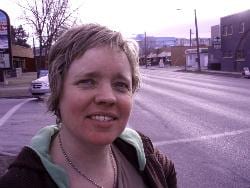The Alberta government has proposed a new law that gay and lesbian leaders say will seriously hamper teachers’ ability to raise the issue of sexual orientation in schools.
“It’s a huge step backwards,” says Melissa Luhtanen, president of the Calgary Outlink Centre for Sexual and Gender Diversity. “It’s really going to have an effect on Alberta, where issues are already hidden.”
The Alberta government’s Bill 44 proposes to enshrine the words “sexual orientation” in the province’s Human Rights Act, making it the last jurisdiction in the country to do so. But at the same time, the bill proposes to allow parents to opt their children out of any lessons that involve religion, sexual orientation and sexuality.
“It seems they pandered to the rightwing by bringing in the parental rights clause,” says Brendan Van Alstine, a social worker with the Pride Centre of Edmonton.
Luhtanen, a human rights educator with the Alberta Civil Liberties Research Centre, says that the parental rights clause opens up a huge can of worms, because the government is proposing to add it to the Human Rights Act. That means teachers and school administrators could be hauled before a human rights tribunal if they talk about what some consider taboo subjects without parents’ permission.
“Teachers won’t be able to raise things on an impromptu basis and they won’t be able to respond to kids who do, either,” says Laurie Blakeman, a Liberal MLA from Edmonton who is leading her party’s opposition to the bill.
“This clause starts to insert itself into biology, English literature and other subjects,” she says. “It creates a problem for teachers who don’t call a halt to discussions.”
According to Luhtanen, it also creates a problem for teachers who avoid subjects like sexual orientation, especially when kids are subjected to homophobic bullying. As the mother of a grade one student, she wants her kid to learn that being gay is okay. “It puts schools between a rock and a hard place,” she says.
For instance, Luhtanen’s daughter’s teacher encourages students to bring books to class, to read out loud to their classmates. Recently, her daughter brought One Dad, Two Dads, Brown Dad, Blue Dad to class. Luhtanen fears her daughter’s teacher would think twice about reading that book to her class, if the new bill becomes law.
Organizations that represent Alberta educators are coming together in opposition to the bill. Already, the Alberta School Boards Association, the Alberta School Councils’ Association, the College of Alberta School Superintendents and the Alberta Teachers’ Association have all united in anger against the province’s Conservative government.
“These are not usually groups who come together and support each other,” says Blakeman. “It’s quite remarkable.”
The Tory minister in charge of passing Bill 44, Lindsay Blackett, is considered one of several rightwing rising stars in Premier Ed Stelmach’s government. In a recent Edmonton Journal article headlined “Stelmach’s government shifts from left to right,” reporter Sheila Pratt writes: “All (these new ministers) have brought individual agendas to the table — often dramatic new policies — and carried on with very little, if any, public consultation. In many cases, the public first learned about legislation only after it was tabled.”
What makes Luhtanen especially frustrated is that parents in Alberta already have the authority, under the province’s School Act, to yank their kids out of lessons dealing with sexuality and religion. She doesn’t feel it’s necessary to add it to the Human Rights Act, where she doesn’t think it will hold up in court, anyway.
“It will probably be overturned and thrown out,” she says. “But that will take years.”
In the meantime, Liberal and NDP opposition members are campaigning to stop the bill with a petition, an upcoming rally and proposed amendments. Blakeman says the government’s move has caused its own caucus to become divided between Red Tories, who tend to be fiscally conservative but socially progressive, and rural MLAs, who preach so-called family values.
“You have to remember that, in Alberta, the Conservatives have a major majority,” says Luhtanen. “When the vote comes, it’s going to have to be the Conservatives that vote it down.”

 Why you can trust Xtra
Why you can trust Xtra


